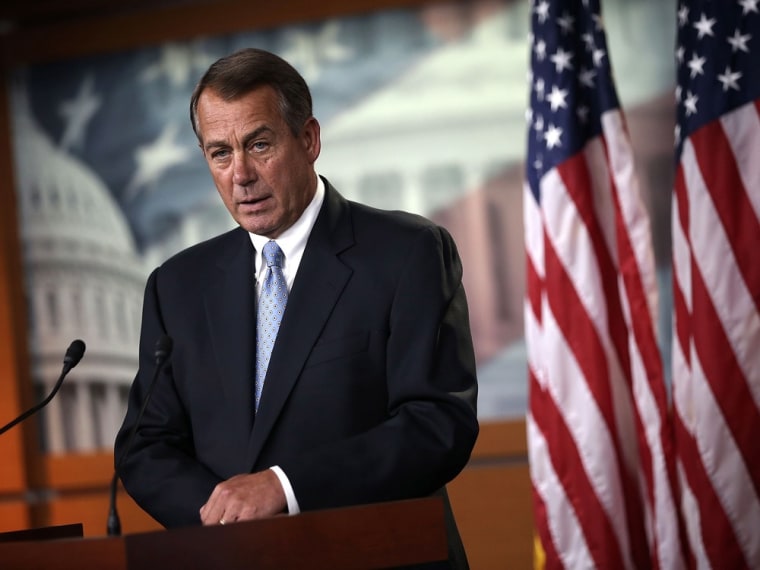When it returns from its August recess on Sept. 9, Congress will have relatively little time to meet two fiscal deadlines: one for enacting a bill to pay for government operations beyond Sept. 30, and another – in October or November – for increasing the government’s ability to borrow money.
On Wednesday in a speech in Illinois, President Barack Obama will seek to shape how the public sees the fiscal decisions that Congress will be making. He’ll discuss themes he has addressed since becoming president in 2009, the need for more jobs and higher incomes, but will also try to connect those topics to the choices Congress faces on debt, taxes and spending.

One challenge for Obama in his speech Wednesday will be to explain to his listeners how the federal government's $16.7 trillion borrowing limit is connected to the persistent high level of unemployment, especially the increase in long-term unemployment. There are still more than 4 million people looking for work and unable to find a job who have been doing so for six months or more, according to the Bureau of Labor Statistics.
House Speaker John Boehner told reporters Tuesday, “We’re not going to raise the debt ceiling without real cuts in spending.”
He warned of what he called “a big set-up that’s coming in this speech” from Obama. “The president wants to raise taxes so he can do more stimulus spending. The fact is it’s his sequester and if we’re going to get rid of his sequester we’re going to have to look for smarter spending cuts in order to do that.”
On Monday the White House Office of Management and Budget issued a veto threat over any spending bill “that implements the House Republican budget framework."
While discord was in the air Tuesday, some of the intensity has seeped out of the debate on debt and fiscal policy since 2011.
That’s partly because no matter how awkwardly Obama and Congress arrived at the current de facto fiscal policy of higher taxes and reduced spending, that policy has been a success in reducing the budget deficit.
The tax increases on higher-income Americans which Obama signed in the Affordable Care Act in 2010 and the year-ending American Taxpayer Relief Act – combined with more Americans working and higher incomes for some – have resulted in nearly a 20 percent increase in individual income tax revenues in the first nine months of the current fiscal year (October 2012 to June 2013) compared with the same period in the prior year, according to the Congressional Budget Office (CBO).
At the same time, the 2011 Budget Control Act and its spending sequester has restrained outlays, which are down 4 percent in the first nine of month of the fiscal year.
The deficit in the current fiscal year, which ends Sept. 30, will be only 4 percent of gross domestic product (GDP), CBO projects, down from nearly 9 percent of GDP in 2011.
But the improving fiscal situation doesn't change the longer-term CBO forecast for higher deficits and significantly larger federal debt relative to national income over the next ten years. By 2023 interest payments on the debt will be 14 percent of federal outlays, compared to 6 percent this year.
On spending, despite some talk of bipartisan “dysfunction,” the House has passed energy, military construction/veterans, and homeland security spending bills and a defense authorization bill with bipartisan majorities. In the case of the military construction/veterans spending bill, there was near unanimity in the House.
But disagreement remains with the Senate and with Obama on these measures, and there are still several more annual spending bills awaiting congressional action. The current pace of approval of spending bills suggests that in September Congress may also need to pass another catch-all measure called a “continuing resolution” to fund government operations, to cover at least a few months.
An accord on that spending bill could be wrapped into a broader deal on raising the government’s $16.7 trillion debt limit, which the Treasury is now using “extraordinary measures” – cash-flow management maneuvers – to avoid reaching.
At some point, estimated by the Bipartisan Policy Center to be “between mid-October and mid-November,” the Treasury won’t be able to repay its creditors, pay all the government’s bills, and send out benefits payments to the retired and disabled.
With this ugly scenario just over the horizon, Senate Democrats have tried to pressure the Republicans to agree to a House-Senate conference to consider a budget plan for Fiscal Year 2014.
Senate Budget Committee Chairman Patty Murray, D-Wash., noted last week that Congress will be in session only until the beginning of August. The House and Senate each have passed quite different budget blueprints for Fiscal Year 2014 which begins on Oct. 1.
If the two chambers can’t reach a budget agreement before the recess starts, Murray said last week, “we are going to return in September with very little time before a potential government shutdown on October 1. We still have a window of opportunity to reach an agreement before we are in crisis mode…. (but) it is closing quickly.”
But with a House-Senate conference, Democrats could potentially use a budget mechanism called “reconciliation" to overcome the Senate need for 60 votes to pass legislation – opening the door both to raising debt limit and to another round of tax increases. With the “reconciliation" weapon looming over them, a small group of conservative senators have objected on the Senate floor every time Murray has made her request for unanimous consent to “go to conference” with the House on a budget plan.